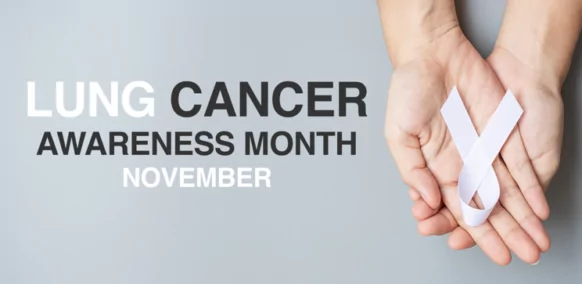Lung Cancer Awareness Month in the UK: A Time to Act
November is Lung Cancer Awareness Month, highlighting risks, symptoms, and treatment of the leading cause of cancer deaths worldwide.


November is Lung Cancer Awareness Month, it is an essential time to educate the public about the risks, symptoms, and treatment of the leading cause of cancer-related deaths worldwide.
Understanding Lung Cancer
Lung cancer primarily affects the lungs, but it can spread to other parts of the body if not caught early. Smoking remains the leading cause, accounting for 85% of cases. (Source WHO). However, non-smokers can also develop the disease due to factors such as air pollution, exposure to harmful substances like asbestos, or genetic predisposition.
What are the statistics
With over 43,000 new cases of lung cancer diagnosed annually, the disease affects thousands of individuals and families each year. Despite advancements in treatment, the UK faces significant challenges in early diagnosis and prevention. (Source NHS).
Key statistics include:
- Survival Rates: Only 20% of people diagnosed with lung cancer in England and Wales survive five years or more after their diagnosis. (Source Cancer Research UK). Survival is significantly higher when the disease is detected early, underscoring the importance of timely screening and diagnosis.
- Late Diagnosis: Around two thirds of lung cancer cases are diagnosed at an advanced stage when curative treatment is no longer possible. (Source HSSIB)
The Role of Early Detection
Early diagnosis is critical in improving survival rates. When detected at stage 1, the five-year survival rate for lung cancer can be as high as 60-70%. (Source Cancer Research UK). However, symptoms like persistent cough, chest pain, or unexplained weight loss are often mistaken for less serious conditions.
The UK’s Lung Health Check Programme, which targets high-risk groups such as long-term smokers, is a significant step forward. Mobile scanning units visiting local communities have already detected hundreds of early-stage cancers (Source BBC News). Yet, more widespread access to screening and awareness campaigns are needed to reach the broader population.
There have also been developments in artificial intelligence, which means that diseases, including lung cancer, can be detected on chest x-rays quicker (Source Wigan today).
Barriers to Early Diagnosis
In the UK, several systemic barriers hinder early lung cancer diagnosis:
- Stigma Around Smoking: Many people delay seeking medical advice because of the stigma associated with smoking-related diseases.
- Limited Awareness: A lack of knowledge about lung cancer symptoms means individuals may not recognize when they need medical attention.
- Healthcare Inequalities: Access to diagnostic services and treatment varies depending on geographic location and socioeconomic status, leading to disparities in outcomes.
Patient’s rights
Lung cancer is often detected at an advanced stage, primarily due to its subtle symptoms in the early phases. Persistent coughing, chest pain, and breathlessness are easily mistaken for less severe conditions, delaying diagnosis.
Early detection is critical in improving survival rates. Diagnostic tools like low-dose CT scans have been proven to detect lung cancer in its earlier stages. However, awareness campaigns also emphasize equitable access to these tools, as socioeconomic and geographical disparities often hinder early diagnosis and treatment for vulnerable populations.
For patients, the consequences of medical negligence in lung cancer cases are life-altering. A delayed diagnosis can mean the difference between a treatable, localized tumour and an advanced, incurable stage of the disease. Beyond the physical toll, families often face emotional distress and significant financial burdens from prolonged or more aggressive treatments.
In such cases, individuals may have the option to make a clinical negligence claim. Please see our page dedicated to lung cancer claims for more information.
Steps to Take
If you or a loved one is concerned about their treatment, they could take the following steps:
- Consult a Specialist: Seek an independent medical opinion to assess whether the care you received was appropriate. You are entitled to ask for a second opinion regarding your treatment and your options.
- Make a Complaint: Whether your care has been provided through the NHS or privately, you are entitled to make a complaint if you feel you’ve been let down.
- Speak to Charities: There are lots of Charities – Roy Castle Lung Cancer Foundation, Macmillan Cancer Support, and Cancer Research UK they can offer support and guidance.
- Request Medical Records: Gather all relevant medical documents that may help you to assess your treatment and to seek advice/guidance.
- Speak to a Lawyer: Contact a legal professional who specialises in medical negligence claims to discuss your options.
- Act Promptly: Be mindful of time limits, and take action as soon as possible.
If you believe you’ve experienced medical negligence related to lung cancer care, it’s critical to act promptly as legal claims often have time limits. A legal or medical professional can guide you through your specific rights and next steps.
Sources
https://www.cancerresearchuk.org/about-cancer/lung-cancer/survival
https://www.cancerresearchuk.org/about-cancer/lung-cancer/survival
https://www.bbc.co.uk/news/articles/cdrdkl2kl32oMore lung-cancer cases detected earlier – BBC News
https://www.who.int/news-room/fact-sheets/detail/lung-cancer